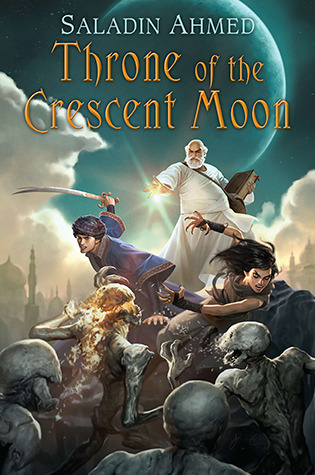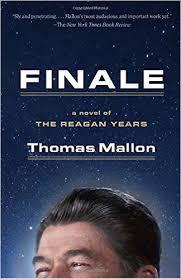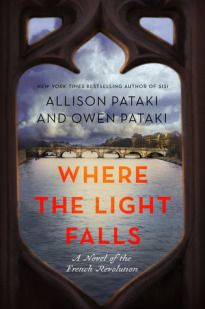Whoa, May already?
Welcome to this month’s Diverse Book of the Month review, this time featuring the first book in The Crescent Moon Kingdoms series, Throne of the Crescent Moon by Saladin Ahmed, originally published in 2012. I read the 2013 edition with the above image (the bloody throne), but here’s an alternate cover (the original one) that everyone loves:

Summary: A sixty-odd-year-old ghul-hunter, Doctor Adoulla Makhslood, teams up with a devout teenage dervish and a feisty girl who can transform into a lioness, to investigate a series of murders that may have supernatural causes. To complicate matters, the Crescent Moon Kingdoms are on the brink of a civil war, between the greedy Khalif, and the Robin Hood-esque “Falcon Prince,” and like it or not, Doctor Adoulla may get dragged into that as well…
What Makes This Book Diverse: If you love sword and sorcery fantasy, but you’re sick of reading about Gary Stus and Mary Sues in Euro-centric kingdoms with white skin (and probably red hair to “set them apart,” ugh, snore), then “Throne” is for you. Not only does it take place in a fantasy land heavily inspired by the Middle East, but it was also written by an Arab American author, Saladin Ahmed — so this counts as an “In Our Own Voices” book on top of the fact that it has a diverse cast of characters. One refreshing aspect is the age range of the characters; instead of a young and spry hero, we get Adoulla, who’s old and creaky and just kind of wants to retire, while the love-struck teenagers get less time in the spotlight. Then there are Adoulla’s friends, an older couple who just want to live happily ever after and leave all the danger behind. The book also has complex female characters, and tackles issues of classism. Perhaps one of the most interesting aspects of this novel is the stance it takes on sex workers, which I’ll talk a little bit more about below in the “Personal Reaction” section.
Genre: Sword and sorcery fantasy
Trigger Warnings:
Pros:
- Puts a severely needed fresh spin on the genre, by taking influence from Middle Eastern culture and folklore from a Middle Eastern perspective (instead of the typical sword and sorcery fantasy that may include Middle Eastern-inspired “kingdoms,” but often paint those as “other” — frightening enemies at their worst, or reluctant and rocky allies at best), due largely in part to the fact that the author is Arab American.
- As mentioned above, there is a diverse cast of complex characters.
- The relationships between the characters are well-developed and believable, especially the friendship between Adoulla, Dawoud, and Litaz.
- Saladin Ahmed manages to create a whole world without falling prey to the infamous info-dump. The main setting, the city of Dhamsawaat, is easy to imagine. Ahmed builds a whole backstory for Adoulla, but gives it to us in little bites here and there, instead of telling us his whole history. (Sometimes this can be a con — see below.)
- There is a great balance of action-driven scenes, and quieter character-developing scenes.
- On a related note, there is a great balance of subplot and main storyline. Because of its short length, this book hyper-focuses on the main story, without getting too bogged down in sideplots, which tends to happen in a lot of 800+ page fantasy novels.
Cons:
- A few reviews on Goodreads mention that there is “not enough worldbuilding.” This is entirely a matter of preference (I, for example, thought there was just the right amount of worldbuilding). But keep in mind the story is less than 300 pages long, so most of it is focused tightly on plot and characterization. If you’re more into books like The Lord of the Rings series that focus more heavily on the setting, and you relish long descriptions of the land and culture, this may not be the book for you.
- Another common complaint is that the characters, though fairly complex, do feel a little bit like one-trick ponies. For instance, Adoulla complains quite often about being old and about not being able to retire; Raseed, the teenage dervish, is all about repressing his sexual attraction to Zamia, the (for lack of a better term) werelion, who is all about avenging her father and tribe’s death.
- The Big Bad (Mouw Awa) is, at least for the length of this book, pure evil, and thus not very complex. However, the conflict between the Khalif and the Falcon Prince is a sort of secondary antagonist, and is less black-and-white/good-and-evil than the ghul, Mouw Awa.
Personal Reaction: It’s been a very, very long time since I’ve gotten so thoroughly wrapped up in a sword and sorcery fantasy. I grew up loving the genre, and fought hard in undergrad to get more professors to appreciate it. However, after graduation, I started to get bored with it, mostly because it often felt like I was reading the same story over and over again, just with different names and slight variations — often supercharged male chauvinist fantasies based on medieval European culture. (Yeah, yeah, okay profs, sometimes you were right…)
But there IS great, unique fantasy and Throne of the Crescent Moon is proof. I loved this book so, so much. It was truly refreshing, and I cannot wait for the next book.
For one thing, I’m always a sucker for Robin Hood-type rogues, and the Falcon Prince was just that. The second he appeared, I was like, “Oh, shoot. I’m hooked.”
Then Ahmed introduced Miri, Adoulla’s former flame and a woman who runs a brothel. At first my reaction to this was, “Ugh, cliche. Let me guess, she’s significantly younger than him?” Because that so often happens in fantasy written by male authors. However, Miri surprised me. She is older, and Adoulla chides his devout, holier-than-thou companion, the teenager Raseed, for turning his nose up at sex workers. This was a refreshing take; the protagonist was not only defending sex workers, but talking about Miri like a human, and not a sex object. Then, later on, Adoulla visits Miri and her characterization surprised me further. (Minor spoiler warning, incoming…) Not only has she moved on romantically because Adoulla won’t commit — instead of pining after the hero — but she also brings up a serious point about the horrible treatment of sex workers in times of war. It was great seeing a sex worker in a novel who wasn’t just a sexualized prize for the hero, not a flat stereotype, but a character with depth.
I’ll admit, I did hate Raseed, the dervish. I have no patience for people who refuse to allow themselves to be human just because of some religious text. Maybe that’s intolerant of me. And I get it, he was raised that way, schooled that way. But I couldn’t stand it. He’s the type of person I just wanna grab and be like, “Oh, honey, love yourself, would you?! And stop being such a judge-y prick.” I suppose his conflict with the Falcon Prince provided some interesting plot, and I see that his character arc is heading in a different direction. I also loved how forward Zamia was with him about their feelings for each other.
Overall, I felt Throne of the Crescent Moon was an entertaining, quick read with a tight focus on plot and some fun characters. (I find it refreshing not only because of its diversity, but also because it isn’t 809548039485 pages long like other fantasy books, honestly. In fact, I thought it was the perfect length. It ended before I got bored with the characters and itched to move on to a different story.)
Now, I have seen critics of this book on Goodreads say, “This book sucked, if you’re looking for something with an Arabian Nights feel, read Howard Andrew Jones.” But here’s the thing: Howard Andrew Jones, though I’m sure he’s a good writer (he’s certainly won tons of awards), is a white guy. Saladin Ahmed shares the identity of his characters. So Throne of the Crescent Moon is an OwnVoices book — and it’s well-written. It’s so important to give authors of diverse identities the opportunity to tell their own stories, and to support them, instead of letting white people control the narrative. And Saladin Ahmed certainly deserves that support! This series is going to be great.
That’s it for this month’s book! If you have any questions or comments, feel free to leave them below.
Happy reading!
Advertisements Share this:




